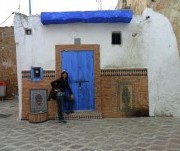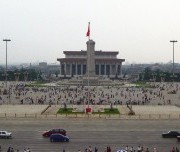Time flies in Morocco which clashes with the idea that Moroccan people take things easy………….
Four and a half weeks ago I travelled to Rabat, Morocco for my third time in the last two years. It does feel as if I have just stepped off the plane and I can not believe four and a half weeks have already past. It does feel as if I never left Morocco and I am not sure if that is due to Morocco being so close to the Canary Islands, where I am from, my passion for the Arabic language or a little bit of everything, but I feel so at home here.
I guess it is normal to feel as if time flies by when you are enjoying every minute of what you are doing: learning a language.
We all know the best way to learn a language is in the country where it is spoken. That is why we encourage language students to take their courses abroad. The pace at which you learn is incomparable and what you experience – the direct contact with the local people and language – is priceless.
To increase my Arabic vocabulary and improve my grammar in Fusha (or al-fuṣḥā الفصحى), also known as Modern Standard Arabic, I have two hours a day of language tuition. My classes do not end there, they continue with everything I do. If I go shopping, I have to practise Arabic, if I take a taxi, I have to practise Arabic, if I go for a walk, I hear Arabic, if I turn on the radio, then I hear Arabic. The Arabic language I learnt in England and the Arabic I learn here in the classroom is very different to the Arabic I hear on the streets of Rabat. What I hear on the streets is called Darija and it´s the dialect spoken in Morocco, an amazing combination of languages (Fusha, French, Spanish, Berber).
A friend described Darija (الدارجة) as the Arabic for everyday tasks here in Morocco, but if you need to become more serious you will need to speak in either French or Fusha which is the modern standard Arabic, “like the BBC’s English”. So that’s what I’m trying to do, learn words and phrases to communicate with people in everyday life situations.
So it is like I am learning another language, Darija (الدارجة), from the beginning while continuing to learn Fusha in the classroom.
I can already greet people in Darija, introduce myself and go to the souq to buy fruit and vegetables which I think is not too bad…
Every time I speak with the local people or exchange conversation in either Darija or Fusha it brings me great joy and motivates me to continue learning the fascinating language of Arabic.
Another thing that really makes me want to continue with my learning adventure is the look of fascination on the local people’s faces when they hear me speaking Arabic. Many Moroccans can’t believe that I want to learn their language and I am interested in their culture!
Many Moroccan people speak at least 2 or 3 languages (Fusha, Darija, French, Berber) and they learn other languages impressively quickly. You just need to go for a walk to Jamaa el Fna Square (ساحة جامع الفناء) in Marrakech, to get a taste for how many languages are spoken in Morocco.
I am really looking forward to learning more about Morocco, the culture, the customs and the Arabic language so I can communicate more with the local people.
No rush though, I have plenty of time………………
Cactus Language Training offers a variety of Arabic language courses in the UK, US, Rabat and Morocco.


